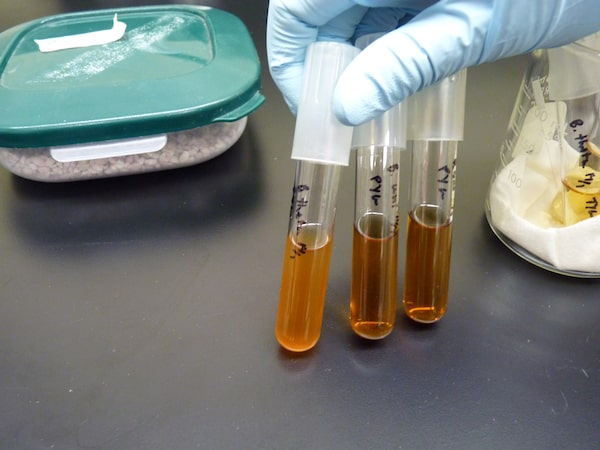
Examples of gut bacteria grown in the lab are shown in test tubes in this undated handout photo.HO/The Canadian Press
Let’s Talk Science and the Royal Society of Canada have partnered to provide Globe and Mail readers with relevant coverage about issues that affect us all – from education to the impact of leading-edge scientific discoveries.
Ana Ramos PhD, Research and Development Scientist at BenchSci
COVID-19 has shown us the power that microbes can have in our daily lives. We learned first-hand that some microbes can take the role of a villain in a story, but the vast majority of microbes are actually the heroes.
You may have heard or read about the microbiome or gut bacteria, or perhaps you have been wondering about the validity of popular marketing buzz-words like probiotics, prebiotics, and live cultured bacteria. But, how much of this buzz is true? In fact, these microbial superheroes can provide a number of benefits to our body by working together because like anything in life, diversity makes these superheroes even stronger.
Upgrading the human body
If you are familiar with video games, you will know about the importance of ‘power upgrades’ for characters. A player will typically obtain a potion or tool that offers special abilities. In the same way, we can upgrade our bodies’ capabilities by adopting a balanced diet and by including foods that contain prebiotics and probiotics.
Our bodies are made of cells that play different roles depending on their location in the body. Human cells have a set of genes, which in turn produce proteins, which eventually conduct most of the tasks required in a cell. However, all our cells have the exact same number of genes! So, even if our cells are able to optimize the use of the genes they have at their disposal, there is only so much they are biologically equipped to do. Enter the microbiome.
Gut, skin, mouth
Microbes are generally unicellular organisms, which pretty much puts them in an “all-or-nothing” situation: if they don’t adapt to their environment they fail to thrive. Fortunately, microbes have the capacity of adapting to their living environments, and in many situations that environment is the human body. As we have seen in the past few years, when a villain adapts quickly to the human body we may get sick. However, if a superhero adapts to the human body it can help us feel better and live a healthier life. How is this possible? Well, microbes also carry their functions based on the genes in their cells, and if the functions enabled by those genes are functions that our own cells can’t perform, we get a biological power-up. The reality is microbes have evolved over the years to establish symbiotic relationships with the human body, establishing strong cultures in our guts, skin, mouth and airways.
Based on metagenomic analyses (the sequencing and analysis of genes in a microbial community), it is estimated that microbiomes living in our bodies provide us with 100-times more genes than those available in our cells[1]. This does not necessarily mean that each gene will provide us with a superpower, but it does increase our chances of a biological power-up.
What science tells us about the gut microbiome and nutrition upgrades
Digestion is one of the main human upgrades associated with the gut microbiome. In fact, many probiotic products are marketed solely based on their impact on digestive health. However, feeling less bloated is not their only benefit!. Assisting in digestion also means absorbing nutrients differently from the food we consume.
The body of scientific research on the power of the gut microbiome has grown steadily in the past decade; in fact, the number of studies focused on the microbiome found in PubMed shows an increase from 1,178 publications in 2010 to 21,536 in 2020. To compare microbiomes, researchers use germ-free mice or mice for which they know the exact composition of their gut microbiome. Such studies have demonstrated that animals can respond differently to different diets based on their gut microbiomes [2]. For example, a 2004 study by a research group that included scientists from University of Toronto, University of Manitoba and others compared mice with different compositions in their gut microbiome, and observed that one of the microbiomes resulted in the mice producing more body fat (and consequently, higher body weight). Even though these animals were fed the same diet and had the same exercise time as the control groups to which they were compared[3].
There is also growing evidence that our gut microbiomes may also play a role in non-digestive conditions, such as neurodegenerative diseases including Parkinson’s disease and Alzheimer’s disease [reviewed in 4], and respiratory conditions such as asthma and allergies [reviewed in 5].
Promoting a healthier microbiome
As it relates to oral and gut microbiomes, what you eat is what your microbiome eats. So, what should we consume to enrich our microbiomes? Are prebiotics and probiotics the only option? Not really!
While prebiotics (products that nourish your microbiome) and probiotics (products that contain live microorganisms to populate your gut with known beneficial communities) can help you establish a healthy microbiome, many foods and snacks will enrich a healthy community of microbes. For example, fiber-rich foods, like oatmeal and banana, and complex carbs, like cooked beans and lentils, are ideal to help your microbiome grow strong!
So next time you are enjoying that nice bowl of yogurt or porridge think of all the power upgrades you are enabling!
Learn more about Microbes
High school students are invited to join Let’s Talk Microbes, on Tuesday, November 23rd, this virtual panel of experts will discuss how the science of genomics is building our understanding of microbes – from health to food, to the environment, to the very future of antimicrobials. This Let’s Talk Science Symposium fuels critical thinking about leading-edge technology, and helps prepare high school students to meet the needs of tomorrow.